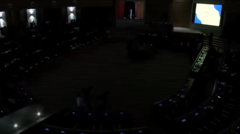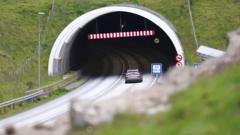During Finance Minister Mthuli Ncube's budget address, Zimbabwe's parliament was plunged into darkness due to an unexpected power outage, emphasizing the country's chronic energy problems tied to drought conditions and diminishing electricity supply.
Darkness in Parliament: Zimbabwe's Budget Speech Interrupted by Power Outage

Darkness in Parliament: Zimbabwe's Budget Speech Interrupted by Power Outage
A power failure during Zimbabwe's parliamentary budget speech highlights the nation's ongoing energy crisis, exacerbated by climate challenges.
In an unexpected twist that left politicians and officials in shock, Zimbabwe's parliament experienced a power cut as Finance Minister Mthuli Ncube neared the conclusion of his budget speech. The sudden loss of power cast darkness over the chamber, affecting key figures such as President Emmerson Mnangagwa, Vice-President Constantino Chiwenga, and various members of parliament.
The incident is seen as reflective of Zimbabwe's ongoing energy crisis, which has been marked by alarming 12-hour daily blackouts. These outages are significantly driven by a debilitating drought that has severely curtailed electricity production at the Kariba Dam, Zimbabwe's primary energy source. As the room descended into darkness, opposing MPs denounced the blackout as a stark representation of the nation's dire predicament.
George Manyaya, spokesperson for the Zimbabwe Electricity Supply Authority (Zesa), attempted to clarify the situation, indicating that the blackout was unplanned and that parliament typically enjoys a dedicated electricity supply shielded from power cuts. He attributed the unanticipated outage to a lightning strike rather than a systematic failure.
Prior to the blackout, Minister Ncube delivered grim news, stating that the agricultural sector was projected to shrink by 15% this year due to the drought-induced conditions. Conversely, he forecasted a hopeful economic expansion of 6% for the following year, buoyed by expectations of above-average rainfall that could also enhance electricity availability.
This incident serves as a poignant reminder of the challenges Zimbabwe faces, blending the urgency of economic reform and environmental resilience in the wake of climate change.
The incident is seen as reflective of Zimbabwe's ongoing energy crisis, which has been marked by alarming 12-hour daily blackouts. These outages are significantly driven by a debilitating drought that has severely curtailed electricity production at the Kariba Dam, Zimbabwe's primary energy source. As the room descended into darkness, opposing MPs denounced the blackout as a stark representation of the nation's dire predicament.
George Manyaya, spokesperson for the Zimbabwe Electricity Supply Authority (Zesa), attempted to clarify the situation, indicating that the blackout was unplanned and that parliament typically enjoys a dedicated electricity supply shielded from power cuts. He attributed the unanticipated outage to a lightning strike rather than a systematic failure.
Prior to the blackout, Minister Ncube delivered grim news, stating that the agricultural sector was projected to shrink by 15% this year due to the drought-induced conditions. Conversely, he forecasted a hopeful economic expansion of 6% for the following year, buoyed by expectations of above-average rainfall that could also enhance electricity availability.
This incident serves as a poignant reminder of the challenges Zimbabwe faces, blending the urgency of economic reform and environmental resilience in the wake of climate change.






















